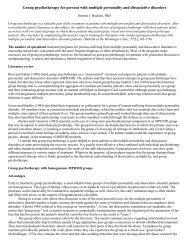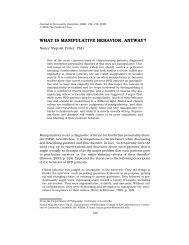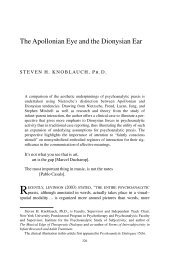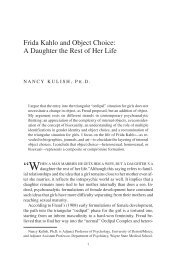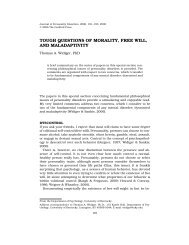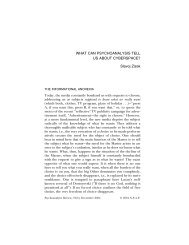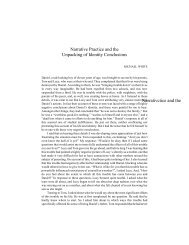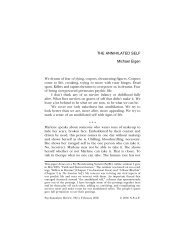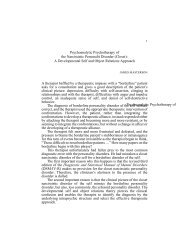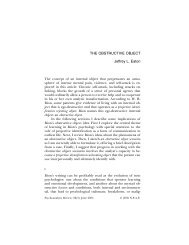What's a Good Object to Do? - PsyBC
What's a Good Object to Do? - PsyBC
What's a Good Object to Do? - PsyBC
You also want an ePaper? Increase the reach of your titles
YUMPU automatically turns print PDFs into web optimized ePapers that Google loves.
What’s a <strong>Good</strong> <strong>Object</strong> <strong>to</strong> <strong>Do</strong> 5<br />
⎯⎯⎯⎯⎯⎯⎯⎯⎯⎯⎯⎯⎯⎯⎯⎯⎯⎯⎯⎯⎯⎯⎯⎯⎯⎯⎯⎯⎯⎯⎯⎯⎯⎯⎯⎯⎯⎯⎯⎯⎯⎯⎯⎯<br />
are garnered from years of practice and changing theoretical contexts.<br />
It is my belief that actual clinical experience with patients (our<br />
hermeneutic data, if you will), accompanied by careful, intense<br />
circumspection and debate, will lead <strong>to</strong> more reliable statements about<br />
higher levels of abstraction <strong>to</strong> accompany an evolving theory of<br />
relational technique. But we are not there yet. When I reflect on my<br />
own evolution as a relational psychoanalyst, I am reminded of the<br />
time I was treating my training control case, over 20 years ago. Toward<br />
the end of a session, it started <strong>to</strong> rain heavily. Noticing that my patient<br />
had not come with an umbrella and would surely be soaked on this<br />
cold day in March, I <strong>to</strong>rtured briefly over the wisdom of lending him<br />
one of the extra umbrellas that had gathered in my closet. Would this<br />
be a major transgression, a libidinal gratification forever sullying the<br />
development of the transference neurosis and fatally derailing the<br />
treatment Was I involved in a major countertransference acting out<br />
requiring my own continued analysis Or was it simply a thoughtful,<br />
nonsexual but loving gesture required by the serendipi<strong>to</strong>us forces of<br />
Mother Nature, forces that as far as I was concerned might fall outside<br />
the purview of transference Damning Charles Brenner, and every<br />
supervisor I ever had, I gave the patient an umbrella; I figured we<br />
would deal with the interpretive aftermath in future sessions.<br />
In fact, we did deal with the conflict-laden dependency issues evoked<br />
by my act of giving and his reluctance <strong>to</strong> accept, and the analysis<br />
continued. I was beginning <strong>to</strong> learn that my interventions, per se, at<br />
choice points in treatment were often not as important as analyzing<br />
the patient’s reactions <strong>to</strong> my interventions as well as the internal or<br />
coconstructed precipitants of my interventions. The umbrella episode,<br />
for me, marks the beginning of my shifting clinical sensibilities, 2 and<br />
these shifts have been channeled in<strong>to</strong> altered theoretical organizations.<br />
For example, years after the analysis ended, the patient <strong>to</strong>ld me he<br />
considered my abandoning an analytic stance by offering him the<br />
umbrella one of the pivotal points in his treatment. He had observed<br />
my discomfort (my self-<strong>to</strong>rture), my humanness, and my decency as<br />
my being just another person, who, like him, did not always have<br />
perfect answers. Today I would say he discovered the good object in<br />
me. That was not an encounter with the idealized or exciting object,<br />
⎯⎯⎯⎯⎯⎯⎯⎯⎯<br />
2<br />
Since that time, similar sentiments have been expressed by the contemporary<br />
Kleinians (Schafer, 1997) working in England.



